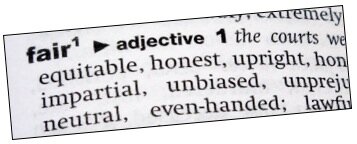


In September’s newsletter we looked at what the Ombudsman’s lens is on substantive and procedural fairness.
Another aspect of fairness that the Ombudsman looks at is the practice of equity. Equitable fairness has to do with how we treat parties to a complaint. It is about ensuring that people are treated fairly, not necessarily identically.
To intend to be fair is important but it is actually the result that matters.
Many people believe that treating people fairly means treating everyone the same. But in fact, treating people differently in order to provide access to the same result is key. Being inclusive is critically important if we are going to remove barriers to service and achieve equitable service delivery with results that are fair to everyone.
Was the process inclusive? Were issues such as power, vulnerability and marginalization considered? Was the agency approachable?
For instance, let’s say a public servant gives Persons X, Y and Z ten days to respond to a request for information. And let’s say X and Y are both native English speakers, but Z, it turns out uses English as a third language, and at that, never in a business context. It could be argued that it is unfair to give Z the same number of days as X and Y, because in fact Z has to go through more steps – perhaps soliciting the help of a friend/family member, or even a translator.
Or let’s say a native English speaker, A, is party to a complaint, but A has significant post-secondary education and works as a public servant. By contrast, B – who is also a native English speaker - has a Grade 10 education and never writes as part of his or her work. If our office were to treat everyone the same, then it is likely that A’s written submissions would be better organized and more persuasive than that of B – just because they have experience with that format.
In each of the above cases, the Ombudsman would look at the issues of equitable fairness, and the process of the decision-making that respects equitable treatment.
Simply put, equitable fairness is about how the person (or group) was treated in the process, how the person (or group) feels about the process itself and what happened as an outcome.
Substantive + Procedural + Equitable = Fair Administration
And so the three corners of fairness your City’s Ombudsman looks at include, substantive fairness, which is about the fairness of the decision itself, procedural fairness, which is how the decision was made and equitable fairness.